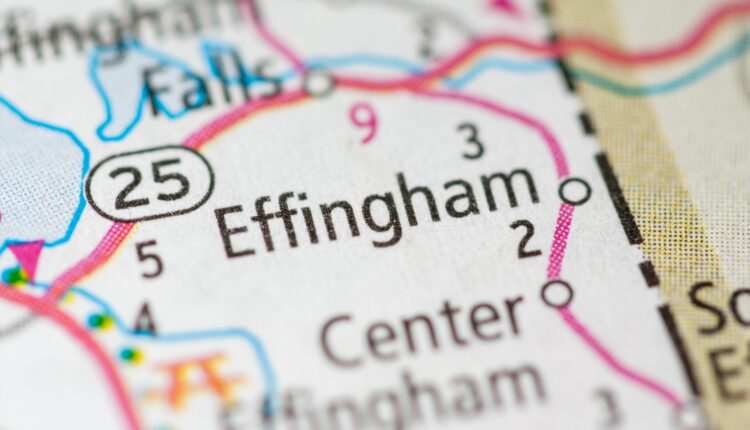
Photo of a sign on the Black Heritage Trail discussing James Stavers. (Douglas Whitfield/ CC BY-SA 2.0)
The Black Heritage Trail features a series of historic markers throughout NH towns. It serves as an acknowledgment of the history of Black Americans.
The Black Heritage Trail is, first and foremost, a nonprofit organization created to “promote awareness and appreciation of African American history and life in order to build more inclusive communities today.” The group has established several key historic markers throughout New Hampshire (and two in Maine) honoring Black pioneers and soldiers who made significant contributions to the Granite State.
The Trail honors the fact that, for over 300 years, African people and their descendants have played an important, though often overlooked, role in the state’s history. Taking a trip to view these historic markers is a somber and informative occasion, as it forces you to confront the fact that Portsmouth was part of the trans-Atlantic slave trade. It also inspires a sense of admiration for those who worked tirelessly to help slaves escape captivity and find freedom in Canada and beyond.
Guided tours are available for those who would like to have someone accompany them along the Black Heritage Trail and provide more information about the history of each location. These tours cost $20 per adult, $15 per military member and senior, and $10 for students. Purchase tickets and schedule your guided tour by clicking this link. You can register for additional events, like the “Thirst for Freedom: From NH’s Slave Trade to Its Civil Rights Movement,” here.
You’re welcome to visit the markers on your own in any order that you’d like. For more information on self-guided tours, including a PDF of the Black Heritage Trail Map, click here. Trolley and bus tours are also available, as are virtual options.
Creation of the Black Heritage Trail
Created in the early 1990s, the Portsmouth Black Heritage Trail was established as a way to commemorate the Granite State’s Black history, providing a visible means for visitors and residents to learn more about notable people and places. Tours were first held in Hancock, located in the western region of the state, where a formerly enslaved man named Jack Ware lived during the 1700s.
Since the 1990s, the trail has expanded to feature 16 historic sites, with an additional handful of markers scheduled to be unveiled during the remaining months of 2025. Though originally established as the Portsmouth Black Heritage Trail, the Black Heritage Trail of New Hampshire created its own location in 2018, seeing the organization move to its current 222 Court Street base in Portsmouth.
In addition to operating tours, the group also offers workshops, school outreach programs, lectures, mobile programs, and more.

Stops along the Black Heritage Trail
Currently, there are 16 historic markers indicating the Black Heritage Trail throughout New Hampshire and Maine. The most recent was placed on May 3, 2025, and honors Ona Judge Staines, who was enslaved by President George Washington and his wife, Martha, before Staines fled to freedom in Portsmouth. She eventually settled down in Greenland, where the marker is placed. You can learn more about her and this new stop here.
Additional stops along the Black Heritage Trail can be found in the following locations (you can find more information about the people being honored by clicking the link embedded in each town name):
- Andover, honoring Richard Potter
- Derry, honoring William Hobdy
- Dover, honoring Nellie Brown Mitchell and Edward Everett Brown
- Dunbarton, honoring Scipio Page
- Exeter, honoring the town’s early Black community and Black Revolutionary War soldiers
- Hancock, honoring the Due Family
- Jaffrey, honoring Amos Fortune
- Kittery Point/Kittery, ME, honoring Clayton & Hazel Sinclair and Rock Rest
- Milford, honoring Harriet E. Wilson
- Milford, honoring Harriet W. Wilson at the historic Nehemiah Hayward Homestead
- Nashua, honoring Don Newcombe and Roy Campanella
- Warner, honoring William Braddish, Ichabod Twilight, and John F and James Haskell
- Windham, honoring Peter Thom, Jeffry, Pompey, and Rose
Another new marker will be unveiled in Hampton on July 12, honoring Dinah Small Burdoo, a freed slave. If you’d like to attend the unveiling, click here for more details. You can learn more about Burdoo herself here and here.
According to the Black Heritage Trail website, additional unveilings will take place in 2025 in Canaan, Meredith, Star Island, Dover, and Hollis, though details have yet to be announced.

Planning your trip along NH’s Black Heritage Trail
When it comes to visiting the Black Heritage Trail, you can get the most out of your experience by taking a guided tour. If you’d like to do a self-guided tour, or simply take time during existing trips to visit these historic markers, it’s very easy to do so.
Numerous blogs have broken down the process of walking the historic trail, like Eat Walk Learn, which also features helpful photos and information about each of the stops they visited. You can also check out this breakdown of walking tours by PortsmouthNH.com.
For those who want to learn more about the Black Heritage Trail but face travel or mobility challenges, you can visit their official YouTube channel to learn more. Special talks, marker unveilings, events, and museum walk-throughs are found on the channel’s various playlists. This provides an engaging way to learn more and to see the markers from the comfort of your own home.
For a more detailed look and breakdown of several stops along the Black Heritage Trail, please click here.
If you want to learn more about New Hampshire’s African American History, you can also visit Strawberry Banke in Portsmouth, which highlights several additional sites of significance, including:
- The Marshall Pottery Site
- The Sherburne House
- The William Pitt Tavern
- The Wheelwright House
- Stoodley’s Tavern
- The Penhallow House
This PDF provided by the Black Heritage Trail is another great resource, as it indicates places found throughout downtown Portsmouth, like the African Burying Ground and the NH Gazette, which are equally important.
Additional information
You can read more stories about New Hampshire’s Black History here, and search through the Black Heritage Trail’s database to find information about the African and Black history of the Granite State, beginning with enslavement during Colonial times through the Civil Rights Movement and beyond.
Related: These 5 Black-owned eateries in New Hampshire deserve a visit

5 unsung films that dramatize America’s rich labor history
By Peter Dreier, Occidental College The U.S. is in the midst of a new upsurge of union organizing. Is a Hollywood drama about angry Starbucks...

What New Hampshire’s immigrant population looked like in 1900
What New Hampshire's immigrant population looked like in 1900 Since the first successful English colony settled in Jamestown in 1607, flows of...

The answers to 6 burning questions about Mount Washington
Head up New Hampshire’s tallest peak with these facts about Mount Washington tucked into your backpack. As we approach hiking season, it’s good to...

Black History Month explained: Its origins, celebrations and myths
By HAYA PANJWANI Associated Press WASHINGTON (AP) — Beginning Feb. 1, schools, museums and communities across the nation will mark the start of...

The strangest New Hampshire town names
Learn about seven funky New Hampshire town names and the fascinating stories behind them. 1. Stark Though its name might sound basic and bare, this...

Did you know Portsmouth has 6 sister cities around the world?
Learn all about the relationship Portsmouth, New Hampshire, has with its six sister cities located in six different countries across the globe. ...




